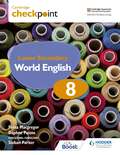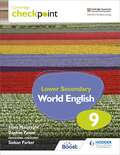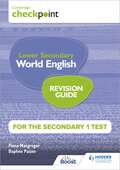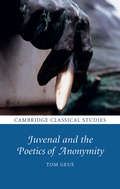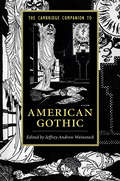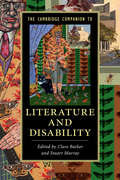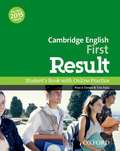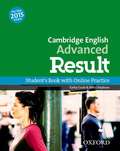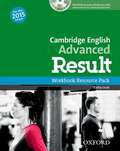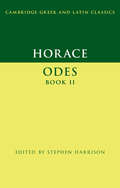- Table View
- List View
Cambridge Checkpoint Lower Secondary World English Student's Book 8
by Daphne Paizee Fiona MacgregorCheckpoint World English Stage 8 has been endorsed by Cambridge Assessment International Education.This series offers full coverage of the learning objectives for the Cambridge Lower Secondary English as a Second language curriculum framework (0876) and is mapped to the Common European Framework of Reference.- Stimulate learners with model texts and a range of activities to develop skills, knowledge and comprehension.- Revisit previous knowledge with the 'Do you remember?' feature to recap topics and activate schema, along with practice tasks, exercises and 'Challenge yourself' activities to consolidate learning. - Clearly address the key objectives: reading, writing, speaking, listening and use of English.- Support activities and knowledge covered in the Student's Book with the accompanying Workbook and Teacher's Guide with Boost subscription.- Audio files are available free at https://www.hoddereducation.co.uk/cambridgeextras
Cambridge Checkpoint Lower Secondary World English Student's Book 9
by Daphne Paizee Fiona MacgregorWe are working with Cambridge Assessment International Education to gain endorsement for this forthcoming title.This series offers full coverage of the learning objectives for the Cambridge Lower Secondary English as a Second language curriculum framework (0876) and is mapped to the Common European Framework of Reference.- Stimulate learners with model texts and a range of activities to develop skills, knowledge and comprehension.- Revisit previous knowledge with the 'Do you remember?' feature to recap topics and activate schema, along with practice tasks, exercises and 'Challenge yourself' activities to consolidate learning. - Clearly address the key objectives: reading, writing, speaking, listening and use of English.- Support activities and knowledge covered in the Student's Book with the accompanying Workbook and Teacher's Guide with Boost subscription.
Cambridge Checkpoint Lower Secondary World English Student's Book 9
by Daphne Paizee Fiona MacgregorCheckpoint World English Stage 9 is endorsed by Cambridge Assessment International Education.This series offers full coverage of the learning objectives for the Cambridge Lower Secondary English as a Second language curriculum framework (0876) and is mapped to the Common European Framework of Reference.- Stimulate learners with model texts and a range of activities to develop skills, knowledge and comprehension.- Revisit previous knowledge with the 'Do you remember?' feature to recap topics and activate schema, along with practice tasks, exercises and 'Challenge yourself' activities to consolidate learning. - Clearly address the key objectives: reading, writing, speaking, listening and use of English.- Support activities and knowledge covered in the Student's Book with the accompanying Workbook and Teacher's Guide with Boost subscription.- Audio files are available free at https://www.hoddereducation.co.uk/cambridgeextras
Cambridge Checkpoint Lower Secondary World English for the Secondary 1 Test Revision Guide
by Daphne Paizee Fiona MacgregorAchieve maximum potential using step-by-step guidance that helps to practise skills learned and improve exam technique.- Build confidence with practical study tips and effective revision strategies.- Reinforce understanding with clear explanations of every topic covered in the Cambridge Lower Secondary Checkpoint curriculum framework with a focus on Reading, Writing, Speaking and Listening and Use of English.- Strengthen and test language and vocabulary skills with a range of questions and worked examples.Answers and audio recordings are available free online at www.hoddereducation.com/cambridgeextras
Cambridge Checkpoint Lower Secondary World English for the Secondary 1 Test Revision Guide
by Daphne Paizee Fiona MacgregorAchieve maximum potential using step-by-step guidance that helps to practise skills learned and improve exam technique.- Build confidence with practical study tips and effective revision strategies.- Reinforce understanding with clear explanations of every topic covered in the Cambridge Lower Secondary Checkpoint curriculum framework with a focus on Reading, Writing, Speaking and Listening and Use of English.- Strengthen and test language and vocabulary skills with a range of questions and worked examples.Answers and audio recordings are available free online at www.hoddereducation.com/cambridgeextras
Cambridge Classical Studies: Juvenal and the Poetics of Anonymity (Cambridge Classical Studies)
by Tom GeueThe satirist Juvenal remains one of antiquity's greatest question marks. His Satires entered the mainstream of the classical tradition with nothing more than an uncertain name and a dubious biography to recommend them. Tom Geue argues that the missing author figure is no mere casualty of time's passage, but a startling, concerted effect of the Satires themselves. Scribbling dangerous social critique under a historical maximum of paranoia, Juvenal harnessed this dark energy by wiping all traces of himself - signature, body, biographical snippets, social connections - from his reticent texts. This last major ambassador of a once self-betraying genre took a radical leap into the anonymous. Juvenal and the Poetics of Anonymity tracks this mystifying self-concealment over the whole Juvenalian corpus. Through probing close readings, it shows how important the missing author was to this satire, and how that absence echoes and amplifies the neurotic politics of writing under surveillance.
Cambridge Classical Studies: Latin Literature and its Transmission
by Richard HunterThis is a series of innovative studies in the textual and literary criticism of Latin literature, exploring how these two branches of the discipline are mutually supportive. The contributors include many leading scholars in the field. Individual essays are devoted to Catullus, Cicero, Horace, Lucretius, Ovid, Tacitus and Virgil, and there are also essays on the Renaissance reception of Virgil and on principles of editorial practice. The collection celebrates the extraordinary contribution which Michael Reeve has made and continues to make to Latin studies.
Cambridge Classical Studies: Oscan in the Greek Alphabet
by Nicholas ZairOscan was spoken in Southern Italy in the second half of the first millennium BC. Here, for the first time, all the evidence for the spelling of Oscan in the Greek alphabet is collected and examined. Understanding the orthography of these inscriptions has far-reaching implications for the historical phonology and morphology of Oscan and the Italic languages (for example providing unique evidence for the reconstruction of the genitive plural). A striking discovery is the lack of a standardised orthography for Oscan in the Greek alphabet, which seriously problematises attempts to date inscriptions by assuming the consistent chronological development of spelling features. There are also intriguing insights into the linguistic situation in South Italy. Rather than a separate community of Oscan-speakers who had adopted and subsequently adapted the Greek alphabet in isolation, we should posit groups who were in touch with contemporary developments in Greek orthography due to widespread Greek-Oscan bilingualism.
Cambridge Classical Studies: Virgil’s Ascanius
by Anne RogersonAscanius is the most prominent child hero in Virgil's Aeneid. He accompanies his father from Troy to Italy and is present from the first book of the epic to the last; he is destined to found the city of Alba Longa and the Julian family to which Caesar and Augustus both belonged; and he hunts, fights, makes speeches, and even makes a joke. In this first book-length study of Virgil's Ascanius, Anne Rogerson demonstrates the importance of this character not just to the Augustan family tree but to the texture and the meaning of the Aeneid. As a figure of prophecy and a symbol both of hopes for the future and of present uncertainties, Ascanius is a fusion of epic and dynastic desires. Compelling close readings of the representation and reception of this understudied character throughout the Aeneid expose the unexpectedly childish qualities of Virgil's heroic epic.
Cambridge Companion to the African American Novel
by Maryemma GrahamCombining scholarship covering one hundred fifty years of novel writing in the U. S. , newly commissioned essays examine eighty African American novels. They include well-known works as well as writings recently recovered or acknowledged. The collection features essays on the slave narrative, coming of age, vernacular modernism, and the post-colonial novel to help readers gain a better appreciation of the African American novel's diversity and complexity.
Cambridge Companion to...: The Cambridge Companion to American Gay and Lesbian Literature
by Scott HerringThis Companion examines the connections between LGBTQ populations and American literature from the late eighteenth to twenty-first centuries. It surveys primary and secondary writings under the evolving category of gay and lesbian authorship, and incorporates current thinking in US-based LGBTQ studies as well as critical practices within the field of American literary studies. This Companion also addresses the ways in which queerness pervades persons, texts, bodies, and reading, while paying attention to the transnational component of such literatures. In so doing, it details the chief genres, conventional historical backgrounds, and influential interpretive practices that support the analysis of LGBTQ literatures in the United States.
Cambridge Companions to Literature: The Cambridge Companion to American Gothic (Cambridge Companions to Literature)
by Weinstock Jeffrey AndrewThe Cambridge Companion to American Gothic offers an accessible overview to both the breadth and depth of the American Gothic tradition. This subgenre features works from many of America's best-known authors: Edgar Allan Poe, Toni Morrison, Stephen King, Anne Rice, Henry James, Edith Wharton, William Faulkner, and Flannery O'Connor. Authored by leading experts in the field, the introduction and sixteen chapters explore the American Gothic chronologically, in relation to different social groups, in connection with different geographic regions, and in different media, including children's literature, poetry, drama, film, television, and gaming. This Companion provides a rich and thorough analysis of the American Gothic tradition from a twenty-first-century standpoint, and will be a key resource undergraduates, graduate students, and professional researchers interested in this topic.
Cambridge Companions to Literature: The Cambridge Companion to Literature and Disability (Cambridge Companions to Literature)
by Stuart Murray Clare BarkerThis Companion analyzes the representation of disability in literatures in English, including American and postcolonial writing, across all major time periods and through a variety of critical approaches. Through the alternative ideas of mind and embodiment generated by physiological and psychological impairments, an understanding of disability narrative changes the way we read literature. With contributions from major figures in literary disability studies, The Cambridge Companion to Literature and Disability covers a wide range of impairments, including cognitive difference, neurobehavioral conditions, and mental and chronic illnesses. This book shows how disability demands innovation in literary form and aesthetics, challenges the notion of a human 'norm' in the writing of character, and redraws the ways in which writing makes meaning of the broad spectrum of humanity. It will be a key resource for students and teachers of disability and literary studies.
Cambridge Companions to Literature: The Cambridge Companion to Slavery in American Literature
by Ezra TawilThe Cambridge Companion to Slavery in American Literature brings together leading scholars to examine the significance of slavery in American literature from the eighteenth century to the present day. In addition to stressing how central slavery has been to the study of American culture, this Companion provides students with a broad introduction to an impressive range of authors including Olaudah Equiano, Frederick Douglass, Harriet Beecher Stowe and Toni Morrison. Accessible to students and academics alike, this Companion surveys the critical landscape of a major field and lays the foundations for future studies.
Cambridge Companions to Literature: The Cambridge Companion to William Carlos Williams
by Christopher MacgowanThis Companion contains thirteen new essays from leading international experts on William Carlos Williams, covering his major poetry and prose works - including Paterson, In the American Grain, and the Stecher trilogy. It addresses central issues of recent Williams scholarship and discusses a wide variety of topics: Williams and the visual arts, Williams and medicine, Williams's version of local modernism, Williams and gender, Williams and multiculturalism, and more. Authors examine Williams's relationships with figures such as Ezra Pound, Wallace Stevens, and H. D. and Marianne Moore, and illustrate the importance of his legacy for Allen Ginsberg, Amiri Baraka, Robert Creeley, Robert Lowell, and numerous contemporary poets. Featuring a chronology and an up-to-date bibliography of the writer, The Cambridge Companion to William Carlos Williams is an invaluable guide for students of this influential literary figure.
Cambridge Companions to Literature: The Cambridge Companion to the American Modernist Novel
by Joshua L. MillerThe Cambridge Companion to the American Modernist Novel offers a comprehensive analysis of US modernism as part of a wider, global literature. Both modernist and American literary studies have been reshaped by waves of scholarship that unsettled prior consensuses regarding America's relation to transnational, diasporic, and indigenous identities and aesthetics; the role of visual and musical arts in narrative experimentation; science and technology studies; and allegiances across racial, ethnic, gendered, and sexual social groups. Recent writing on US immigration, imperialism, and territorial expansion has generated fresh and exciting reasons to read or reread modernist novelists, both prominent and forgotten. Written by a host of leading scholars, this Companion provides unique interpretations and approaches to modernist themes, techniques, and texts.
Cambridge Companions to …: The Cambridge Companion to Balzac
by Andrew Watts Owen HeathcoteOne of the founders of literary realism and the serial novel, Honor#65533; de Balzac (1799-1850) was a prolific writer who produced more than a hundred novels, plays and short stories during his career. With its dramatic plots and memorable characters, Balzac's fiction has enthralled generations of readers. 'La Com#65533;die humaine', the vast collection of works in which he strove to document every aspect of nineteenth-century French society, has influenced writers from Flaubert, Zola and Proust to Dostoevsky and Oscar Wilde. This Companion provides a critical reappraisal of Balzac, combining studies of his major novels with guidance on the key narrative and thematic features of his writing. Twelve chapters by world-leading specialists encompass a wide spectrum of topics such as the representation of history, philosophy and religion, the plight of the struggling artist, gender and sexuality, and Balzac's depiction of the creative process itself.
Cambridge Companions to …: The Cambridge Companion to Emma
by Peter SaborThanks to its tightly paced, intricately plotted narrative and its astute psychological characterisation, Emma is commonly thought to be Jane Austen's finest novel. In the twelve chapters of this volume, leading Austen scholars illuminate some of its richest themes and topics, including money and rank, setting and community, music and riddles, as well as its style and structure. The context of Emma is also thoroughly explored, from its historical and literary roots through its publication and contemporary reception to its ever-growing international popularity in the form of translations and adaptations. Equally useful as an introduction for new students and as a research aid for mature scholars, this Companion reveals why Emma is a novel that only improves on re-reading, and gives the lie to Austen's famous speculation that in Emma Woodhouse she had created 'a heroine whom no one but myself will much like'.
Cambridge Companions to…: The Cambridge Companion to Boccaccio
by Guyda Armstrong Armstrong, Guyda and Daniels, Rhiannon and Milner, Stephen J. Rhiannon Daniels Stephen J. MilnerIncorporating the most recent research by scholars in Italy, the UK, Ireland and North America, this collection of essays foregrounds Boccaccio's significance as a pre-eminent scholar and mediator of the classical and vernacular traditions, whose innovative textual practices confirm him as a figure of equal standing to Petrarch and Dante. Situating Boccaccio and his works in their cultural contexts, the Companion introduces a wide range of his texts, paying close attention to his formal innovations, elaborate voicing strategies, and the tensions deriving from his position as a medieval author who places women at the centre of his work. Four chapters are dedicated to different aspects of his masterpiece, the Decameron, while particular attention is paid to the material forms of his works: from his own textual strategies as the shaper of his own and others' literary legacies, to his subsequent editorial history, and translation into other languages and media.
Cambridge Companions to…: The Cambridge Companion to The Body in Literature
by David HillmanThis Companion offers the first systematic analysis of the representation of the body in literature. It historicizes embodiment by charting our evolving understanding of the body from the Middle Ages to the present day, and addresses such questions as sensory perception, technology, language and affect; maternal bodies, disability and the representation of ageing; eating and obesity, pain, death and dying; and racialized and posthuman bodies. This Companion also considers science and its construction of the body through disciplines such as obstetrics, sexology and neurology. Leading scholars in the field devote special attention to poetry, prose, drama and film, and chart a variety of theoretical understandings of the body.
Cambridge Companions to…: The Cambridge Companion to the Beats
by Steven BellettoThe Cambridge Companion to the Beats offers an in-depth overview of one of the most innovative and popular literary periods in America, the Beat era. The Beats were a literary and cultural phenomenon originating in New York City in the 1940s that reached worldwide significance. Although its most well-known figures are Jack Kerouac, Allen Ginsberg, and William S. Burroughs, the Beat movement radiates out to encompass a rich diversity of figures and texts that merit further study. Consummate innovators, the Beats had a profound effect not only on the direction of American literature, but also on models of socio-political critique that would become more widespread in the 1960s and beyond. Bringing together the most influential Beat scholars writing today, this Companion provides a comprehensive exploration of the Beat movement, asking critical questions about its associated figures and arguing for their importance to postwar American letters.
Cambridge English First Result Student's Book with Online Practice
by Tim Falla Paul A DaviesPrepare your students for the new 2015 Cambridge English: First exam.Cambridge: English First Result is fully updated to prepare students for success in the new 2015 exam. The contemporary topics, lively texts and vibrant design keep students motivated and the online practice and online practice test provide plenty of opportunities for further learning outside class.The Teacher's Book includes unit tests, progress tests and a Speaking DVD showing students doing Speaking tests in exam-like conditions, which teachers can play to reassure their class about what to expect on exam day.
Cambridge English: Advanced Result
by Kathy Gude Mary StephensCambridge English: Advanced Result is fully updated to prepare students for success in the new 2015 exam. The contemporary topics, lively texts and vibrant design keep students motivated and the online practice and online practice test provide plenty of opportunities for further learning outside class. The Teacher's Book includes unit tests, progress tests and a Speaking DVD showing students doing Speaking tests in exam-like conditions, which teachers can play to reassure their class about what to expect on exam day.
Cambridge English: Advanced Result Workbook Resource Pack
by Kathy Gude Mary StephensCAE Result is a complete preparation course for the Cambridge English: Advanced (CAE) exam. It uses thought-provoking topics and vibrant images to keep your students motivated.
Cambridge Greek and Latin Classics: Horace (Cambridge Greek and Latin Classics)
by Stephen HarrisonHorace's Odes remain among the most widely read works of classical literature. This volume constitutes the first substantial commentary for a generation on this book, and presents Horace's poems for a new cohort of modern students and scholars. The introduction focusses on the particular features of this poetic book and its place in Horace's poetic career and in the literary environment of its particular time in the 20s BCE. The text and commentary both look back to the long and distinguished tradition of Horatian scholarship and incorporate the many advances of recent research and thinking about Latin literature. The volume proposes some new solutions to established problems of text and interpretation, and in general improves modern understanding of a widely read ancient text which has a firm place in college and university courses as well as in classical research.
